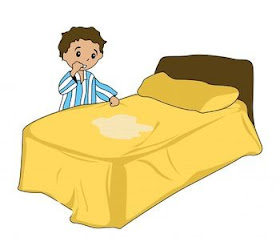Nocturnal enuresis or night time urinary incontinence, commonly called bedwetting, is an involuntary urination while asleep after the age at which bladder control usually occurs. Nocturnal enuresis is considered primary (PNE) when a child has not yet had a prolonged period of being dry. Secondary nocturnal enuresis (SNE) is when a child or adult begins wetting again after having stayed dry.
Bedwetting is the most common childhood urologic complaint. Most bedwetting, however, is just a developmental delay—not an emotional problem or physical illness. Only a 5% to 10% of bedwetting cases is caused by specific medical conditions (Underlying diabetes, neurological problems, bladder disorders). Bedwetting is frequently associated with a family history of the condition (Genetics).
Most girls can stay dry by age six and most boys stay dry by age seven. By ten years old, 95% of children are dry at night. Studies place adult bedwetting rates at between 0.5% to 2.3%.
Hormonal relationship:
A hormone called anti- diuretic hormone, or ADH, causes the body to produce less urine at night. But some people's bodies don't make enough ADH, which means their bodies may produce too much urine while they're sleeping.
Sleep variations:
Some teens may sleep so deeply that they don't wake up when they need to pass urine. These children don’t realize the bladder fullness due to deep sleep.
Psychological issues:
Some experts believe that stress can be associated with enuresis. Family stress, divorce issues, neglect of the child, child abuse etc can have a lot of stress on the kid and they can have these problems.
Management:
Treatments range from behavioral-based options such as bedwetting alarms, to medication such as hormone replacement (ADH). If it is secondary due to organic lesions then accordingly treatment should be given.
Since most bedwetting is simply a developmental delay, most treatment plans aim to protect or improve self-image. Bedwetting children and adults can suffer emotional stress or psychological injury if they feel shamed by the condition most of the time because of the scolding by parents or humiliation by peers .
The children and the parents are taken into the confidence; trying to find out underlying psychological issues, sleep disturbance, fluid intake pattern. Constipation is very important history in many children with voiding dysfunction as voiding and defecation many a times go hand in hand.
Urine routine and culture examination along with Ultrasound and Post Void Residual urine examination and uroflowmetry are often done to rule out any organic pathology. In specific conditions we opt to do urodynamic study.
In primary enuresis we often find normal urodynamic study but sometimes we do come across smaller bladder capacity compared to children of the same age. In secondary enuresis we may come across small capacity bladder, low compliance or detrusor hyper-reflexia.
In secondary cases often it is a team approach with pediatrician, neurophysician or neurosurgeon.
How Is It Treated?
Treatment guidelines recommend that the physician counsel the parents, warning about psychological damage caused by pressure, shaming, or punishment for condition children cannot control.
People with nocturnal enuresis can take some basic steps to prevent an overly full bladder by decreasing the amount of fluids they drink before going to bed. You can reduce the chances that you'll wet the bed by going to the toilet just before bedtime.
It may help to avoid eating certain foods in the evening: Foods that can irritate the bladder include coffee, tea, chocolate, and sodas or other carbonated beverages containing caffeine.
Use bedwetting alarms.
The bedwetting alarms can cause conditioning reflex by awakening the child whenever the bed sheet goes wet. Before he/she begins further to wet, he/she can put the alarm off and go to the toilet quickly and pass urine./Even she does not manage to do it quickly ; he/she should not get discouraged. According to the National Kidney Foundation, 50% to 70% of cases of enuresis respond to treatment with these moisture alarms.
Those children who sleep deeply; the parents can wake them up in midnight and make them pass urine so that the full bladder will not set a reflex urination in the deep sleep.
We usually treat the kids who donot respond to behavioral therapy and life style modification like fluid restriction from evening then we start them on imipramine tablets twice a day (25 mg twice a day).
The other effective option is to start them on desmopressin tablets or nasal spray. The dosage is usually 0.2 mg 1 hour before bedtime. If there is no benefit then the dose is increased 0.4 mg.
The desmopressin can lead to fluid retention and electrolyte imbalance. The child may get headache, edema or weight gain because of the continuous usage. For the same reasons it should be avoided in children with heart disease or increased intracranial pressures.










Thanks for sharing the information about the NOCTURNAL INCONTINENCE:HOW DOCTORS CAN ENSURE DRY NIGHTS.
ReplyDeleteErection Problem Treatment,Men sexual disorder treatment,Sexual Dysfunction in Male,